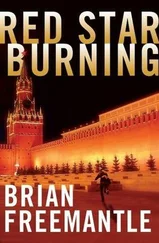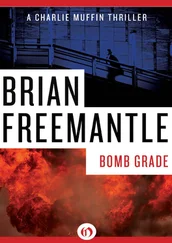Brian Freemantle - Deaken’s War
Здесь есть возможность читать онлайн «Brian Freemantle - Deaken’s War» весь текст электронной книги совершенно бесплатно (целиком полную версию без сокращений). В некоторых случаях можно слушать аудио, скачать через торрент в формате fb2 и присутствует краткое содержание. Жанр: Триллер, на английском языке. Описание произведения, (предисловие) а так же отзывы посетителей доступны на портале библиотеки ЛибКат.
- Название:Deaken’s War
- Автор:
- Жанр:
- Год:неизвестен
- ISBN:нет данных
- Рейтинг книги:4 / 5. Голосов: 1
-
Избранное:Добавить в избранное
- Отзывы:
-
Ваша оценка:
- 80
- 1
- 2
- 3
- 4
- 5
Deaken’s War: краткое содержание, описание и аннотация
Предлагаем к чтению аннотацию, описание, краткое содержание или предисловие (зависит от того, что написал сам автор книги «Deaken’s War»). Если вы не нашли необходимую информацию о книге — напишите в комментариях, мы постараемся отыскать её.
Deaken’s War — читать онлайн бесплатно полную книгу (весь текст) целиком
Ниже представлен текст книги, разбитый по страницам. Система сохранения места последней прочитанной страницы, позволяет с удобством читать онлайн бесплатно книгу «Deaken’s War», без необходимости каждый раз заново искать на чём Вы остановились. Поставьте закладку, и сможете в любой момент перейти на страницу, на которой закончили чтение.
Интервал:
Закладка:
Bartlett stuffed a pillow into the rucksack to give it some convincing bulk, and quickly changed into the hiker’s gear.
“Bright, isn’t it?” said Grearson.
“Of course it is,” said Evans. “People never suspect things that are too obvious.” To Bartlett he said “Why not go take a hike?”
Bartlett moved steadily along the lane, adjusting his trained march to the heavy-heeled plod of a tired walker. He had both hands tucked into the support straps of the rucksack and, with head bent, appeared uninterested in his surroundings. The details were, in fact, being recorded in his memory with the accuracy of a movie camera. There was plenty of available concealment-high banks, higher than a man in places, even Jones-topped by hedges which, in the main, were thick and concealing. Confident that he was completely hidden, Bartlett stopped at a gap, and gazed in at the house. Fifty yards of garden, exposed for most of the way unless they could use the cover of that bisecting hedge. Door locked thick and heavy, which he would have to warn Marinetti about. Covered windows, blind against the coming night. From one of the three clustered chimneys a thin curl of white smoke formed like a question mark. Bartlett was alert to everything about him and heard the trundling farm cart long before its occupants were aware of him. There were four of them, spread-eagled along the edges of an open-sided carrier, with beets piled in the middle. It was being pulled by a tractor, the driver of which wore a collar and tie, as if he were proud of the day’s harvest and wanted to dress properly for it. Bartlett stood aside and as the cart passed one of the men smiled and said, “Ca va?”
Bartlett waved back. It was instinctive caution to shield his face although he was sure that all they would remember would be the colour of his outfit which would be discarded in an hour. He plodded on, looking in at the gate with only the sort of curiosity that a casual passerby might show. There could have been a light at one of the upper rooms, but perhaps it was a trick of the sun penetrating some unseen window at the rear. The lane rose almost immediately beyond the farmhouse boundary, and Bartlett bent into the incline, assessing the distance with each step, wanting to distance himself from any possible observation from the house. Without looking round, he suddenly cut sideways to his left, scrambling up the bank and plunging into the coppice. He sped on until he was deep in the small wood, before turning left again to bring himself out overlooking the house. Before it was visible, he took off the brightly coloured clothing and stacked it against the bole of a tree. Squirming forward on his elbows and knees, he reached the coppice edge. The vantage point gave him a view of both the side and the rear of the farmhouse. The rear door was thick, like the one in front-another reminder for Marinetti. There were no vehicles visible, but there were plenty of outbuildings and barns in which it would have been an elementary precaution to conceal them. As he watched, a man emerged from the back door, strode to the middle of the yard and looked around as if checking for anyone watching. Bartlett didn’t move, knowing he was completely concealed. Appearing satisfied, the man went into one of the barns, to emerge almost immediately. He stopped in almost the same place in the yard for another, then reentered the house.
Bartlett wriggled himself backwards until he had penetrated the treeline and then rose to his feet, brushing away the leaf mould. He returned to the discarded clothing, dressed, and regained the lane in minutes. He descended back towards the village, with the same tired, stiff-kneed walk he had adopted when he passed the house the first time. On this occasion he didn’t bother to look in at the gate, seemingly uninterested in something he had already looked at.
It was past seven by the time he got back to Mulhouse.
“What’s it look like?” demanded Evans at once.
“Well chosen: vision on every side,” reported Bartlett. “If we don’t surprise them, we could be cut to pieces.”
“Shit,” said Jones.
It was 1:40 A.M. when the closed van arrived from Paris. It was obviously impractical to bring the contents into the hotel, so Evans went out to inspect them in the vehicle. He only bothered to take Marinetti with him to check the explosives. The two men returned within half an hour.
“Good” said Evans to Grearson. “Everything we wanted. The Uzis are brand new, still with the original grease.” To the assembled soldiers he said, looking at his watch, “I’ve got two ten.” There was a simultaneous reaction as they synchronized their watches. “Thirty minutes to Rixheim,” continued the man. “Black up and dress on the way. We’ll hit the farmhouse at three.”
In unison they moved towards the door. Involuntarily Deaken said, “Be careful.”
They all looked at him disbelievingly. Melvin said, “Don’t be fucking stupid.”
Edward Makimber emerged from the Teranga Hotel onto the Place de 1’Union, staring around him at the familiar activity of an African township at night. Dakar didn’t really resemble an African town, he corrected himself: the French influence was too strong, with its mathematically careful highways and large buildings. He set out towards the waterfront, wanting to orient himself even though it was late and the office of the men he wanted to see would be closed. Perhaps coming here would turn out to be overly cautious, as it had been in Madeira. But he was determined not to take any risk. Which was why the others were flying in the following day, from Angola. Makimber didn’t like dealing with such people. But sometimes they were necessary. Just like revolution was necessary, if you wanted freedom.
For a long time Carole lay awake and then finally got up and went out on deck. Despite the lateness, the harbour and the town beyond was still bright with light, cars fireflying along the Corniche and the lower roads. She leaned against the deck rail, and thought about a distracted and seemingly lost man called Richard Deaken. He was obviously vulnerable and she felt sorry for him. Which, she recognized, wasn’t professional at all. She would have to be careful.
15
While they had been waiting for the Paris delivery, Bartlett had sketched a series of reconnaissance maps of the lane approach, the side elevation and the front and back assault positions, so now the group moved confidently towards the farmhouse, expertly taking advantage of the high banking and the hedge for cover. The talking, like the map reading, had been done in the Mulhouse hotel room; now the only communication was by hand signals.
Melvin was detached to act as rearguard to warn of anyone approaching from the village, an essential posting after the possible arousing noise of the doors being blown. The inseparable Hinkler and Bartlett were dispatched farther up the lane, to enter by the track that led to the back of the house. Evans, Marinetti, Jones and Sneider hunched by the farm entrance.
Around Marinetti’s right shoulder, like a bandolier, was looped the connection wire; the plastic explosives and the detonators-quite harmless when they were unconnected-were in the satchel slung for balance across the other shoulder. Both he, Evans and Sneider carried Uzi rifles. Jones had the night-sighted Ingrams sniper’s weapon. The four men crouched, relaxed and unmoving, Evans checking his watch to time the progress of Bartlett and Hinkler to the rear: ten minutes had been allowed. At the count he signalled to Jones. The black man rose and vaulted the gate in one fluid movement. The other three rose too, covering the front of the house; this was the most dangerous moment if a guard had been posted. Jones was in full view of the house even when protected by the shadows of the hedge.
Читать дальшеИнтервал:
Закладка:
Похожие книги на «Deaken’s War»
Представляем Вашему вниманию похожие книги на «Deaken’s War» списком для выбора. Мы отобрали схожую по названию и смыслу литературу в надежде предоставить читателям больше вариантов отыскать новые, интересные, ещё непрочитанные произведения.
Обсуждение, отзывы о книге «Deaken’s War» и просто собственные мнения читателей. Оставьте ваши комментарии, напишите, что Вы думаете о произведении, его смысле или главных героях. Укажите что конкретно понравилось, а что нет, и почему Вы так считаете.












